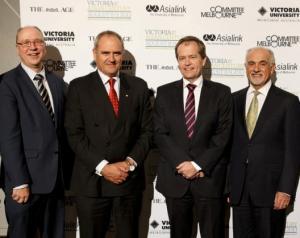
Australians need a mindset change "at all levels" to succeed in the Asian Century, according to Dr Ken Henry.
Speaking at today's Victoria and the Asian Century Conference, the prominent economist said growing Asian economic power had changed the game for Australia.
"Asia's rise has had a profound impact on Australia's pattern of trade, with the share of exports generated by minerals growing more than six-fold in the first decade of this century and, in the same period, China, India and Korea all joining Japan as significantly more important Australian trading partners than the United States," he said.
"Today, China takes more than 35 per cent of Australia's merchandise exports; more than three-quarters of Australia's exports go to Asia."
In the past 20 years, the Chinese and Indian economies have expanded six-fold and, in so doing, trebled their share of the global economy.
"As recently as the 1950s, Asia contributed less than a fifth of global output. Today it contributes more than two-fifths, and by the middle of this century it will generate more than half of the world's output," he said.
Increasing openness and economic liberalization had led to these spectacular developments, he said.
Dr Henry spoke of five core platforms that were essential for Australia to be successful in the Asian Century: building productivity and resilience; development Asia-relevant capabilities; smarter ways of connecting with Asian markets; contributing to regional security; and deeper and broader relationships with people in the region.
"We now find ourselves in the right place at the right time. And, largely because of a history of fortuitous immigration, we have many people who are impressively Asia-literate," Dr Henry said.
"But we can't be complacent. The Asian century also poses formidable regional and global challenges, especially in food, energy and water security, climate security, environmental degradation, urban congestion and growing income inequality."
He said that Victoria had demonstrated excellence in biotech, aviation and aerospace, agriculture, aquaculture and viticulture, hospitality, information and communications technologies, logistics, design, education, health services, and financial services.
"There are many examples of other high-wage countries having secured an indispensable place in regional and global manufacturing supply chains. We need to ask how, and in what areas, Victoria might secure a future in this sort of manufacturing, and in all the other areas in which it has demonstrated excellence," he said.
"Victoria is a state of remarkable economic diversity; a state that, with the right investments, will be well placed to make the most of the opportunities of this Asian century."
